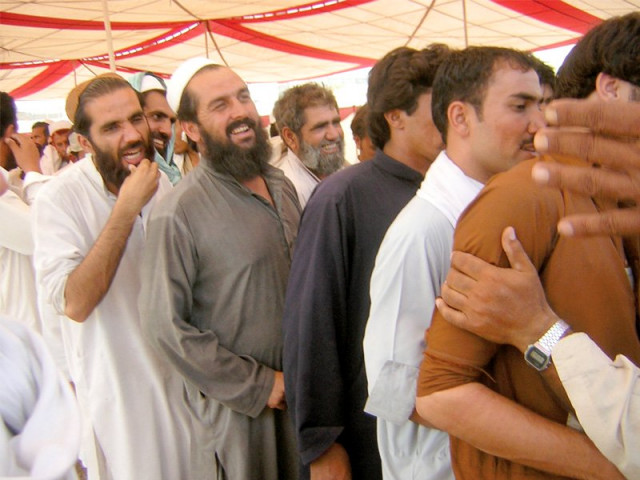Cuts in food ration add to displaced persons’ woes
WFP cites funding shortfall; tribesmen blocking distribution centres.

WFP is now giving each family 40kg of wheat flour per month, instead of 80kg. PHOTO: EXPRESS
Salim Mehsud, from South Waziristan tribal agency, was first displaced by conflict. For over three years he lived at a camp in Dera Ismail Khan, after the military launched an operation against militants in his home area.
Now he has moved again - this time to Peshawar - for entirely different reasons.
“I had no choice. My four small children were literally starving because the ration of wheat flour given to us was cut. And this made it impossible to fill stomachs,” he told Integrated Regional Information Network of United Nations.
“I couldn’t bear to watch my children suffer,” he added. Currently living with relatives, he is looking for a job.
In January, the World Food Program (WFP) cut the ration size of its food basket for about one million internally-displaced persons (IDPs) and 700,000 people affected by floods because of a funding shortfall. It is now giving each family 40kg of wheat flour per month, instead of 80kg. Other commodities are not affected by the cuts.

To continue distributing full rations for the rest of the year, it needs an additional $103 million. In the towns of DI Khan and Tank, where most IDPs from South Waziristan are based, there have been angry protests over the ration cuts.
Some of these protests, by Mehsud tribesmen, are continuing, according to the South Waziristan Coordinator for the Federally Administered Tribal Areas (Fata) Disaster Management Authority Syed Umar.
“We are talking to Mehsud elders, because tribesmen have in some cases blocked distribution centres and are refusing to accept the reduced food ration or allow others to do so,” he said.
WFP spokesperson Amjad Jamal said the government, together with WFP’s implementing partners, are discussing the situation with IDP elders, and “in many areas, the situation is normalising.”

But he warned, “The ongoing conflict in parts of Fata has already impacted food intake among IDP families. They have no means of livelihood other than relief assistance from WFP, other UN agencies and the government.”
“This cut will further impact their health, especially that of children and women,” he added. IDPs and aid workers fear the reduced supply will now become the norm. “Where will funds come from? The IDPs have no choice but to take what they can get, so they are taking the lesser amount, although this is simply not enough to manage,” Abdul Ghazi, a volunteer from the charitable Khidmat Foundation said.
Jamal is more optimistic, pointing out that renewed funding in July last year allowed the full ration to be restored, after a similar cut was made. But for now, this is only a hope, and in the meantime, Ghazi said, families are “desperate”.
Published in The Express Tribune, February 16th, 2013.













COMMENTS
Comments are moderated and generally will be posted if they are on-topic and not abusive.
For more information, please see our Comments FAQ